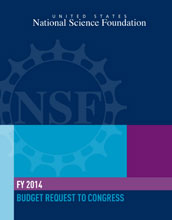News Release 13-066
National Science Foundation Fiscal Year 2014 Budget Request Sustains Momentum for Fundamental Research in Science, Technology and Innovation

NSF's budget request empowers discovery through investments in fundamental research and facilities.
April 10, 2013
This material is available primarily for archival purposes. Telephone numbers or other contact information may be out of date; please see current contact information at media contacts.
The National Science Foundation (NSF) today announced President Obama's $7.626 billion fiscal year (FY) 2014 budget request for the agency, representing an 8.4 percent increase over the fiscal year 2012 enacted budget.
"NSF's fiscal year 2014 budget request empowers discovery through investments in fundamental research and facilities, in STEM education, and in systems and processes to enhance transparency and effectiveness," said NSF Acting Director Cora Marrett, who announced the budget at the agency's headquarters in Arlington, Va. "Collectively these efforts will continue to expand the frontiers of knowledge, drive the nation's innovation economy and address societal challenges."
The budget request prioritizes investments in fundamental research and related activities that represent $6.2 billion of the $7.6 billion budget request. These investments include the recently inaugurated Atacama Large Millimeter Array telescope and other observatories; investigations into novel materials, manufacturing processes and smart systems; advanced cyber infrastructure; and sustainability science and engineering. The Foundation will play an important role in the Administration's recently-announced BRAIN initiative through its research portfolio exploring neural connections from the cellular to human behavioral levels.
NSF will also invest $210 million in major research equipment and facilities construction (MREFC), with an initial funding request for the Large Synoptic Survey telescope, as well as funding to further development of the National Ecological Observatory Network, the Advanced Technology Solar Telescope, the Ocean Observatories Initiative and the Advanced Laser Interferometer Gravitational-Wave Observatory.
The FY 2014 request also highlights NSF's leadership in science, technology, engineering, and mathematics (STEM) education, particularly at the graduate and undergraduate levels. This is part of the Administration's multiagency effort to increase the impact of federal investments on STEM achievement through a national strategy that includes strong collaborations among agencies and leveraging of unique agency assets.
NSF's STEM education portfolio totals nearly $1.3 billion in the FY 2014 request. Investments in this portfolio will support the next generation of leaders in science, technology and innovation through an expanded National Graduate Research Fellowships program, a reorganization of existing undergraduate STEM education programs into the new Catalyzing Advances in Undergraduate STEM Education program, and a new NSF Research Traineeships program. This portfolio also includes important foundational work in research to build the evidence base for successful models in STEM learning both inside and outside of schools.
The FY 2014 request includes measures for improving program effectiveness and efficiency, including ensuring public access to NSF-funded research results, establishing an evaluation capability to expand evidence-based planning and decision-making, modernizing NSF's financial management system (iTRAK), and expanding the use of innovative virtual meeting technologies for the support of merit review panels.
For details about the NSF FY 2014 budget request, visit the NSF website.
-NSF-
-
View Video
Excerpts from NSF's Fiscal Year 2014 Budget Request Presentation
Credit and Larger Version -
View Video
NSF Fiscal Year 2014 Budget Request (edited)
Credit and Larger Version
Media Contacts
Deborah Wing, NSF, (703) 292-5344, email: dwing@nsf.gov
The U.S. National Science Foundation propels the nation forward by advancing fundamental research in all fields of science and engineering. NSF supports research and people by providing facilities, instruments and funding to support their ingenuity and sustain the U.S. as a global leader in research and innovation. With a fiscal year 2023 budget of $9.5 billion, NSF funds reach all 50 states through grants to nearly 2,000 colleges, universities and institutions. Each year, NSF receives more than 40,000 competitive proposals and makes about 11,000 new awards. Those awards include support for cooperative research with industry, Arctic and Antarctic research and operations, and U.S. participation in international scientific efforts.
Connect with us online
NSF website: nsf.gov
NSF News: nsf.gov/news
For News Media: nsf.gov/news/newsroom
Statistics: nsf.gov/statistics/
Awards database: nsf.gov/awardsearch/
Follow us on social
Twitter: twitter.com/NSF
Facebook: facebook.com/US.NSF
Instagram: instagram.com/nsfgov


